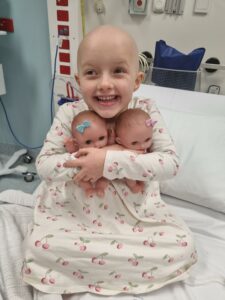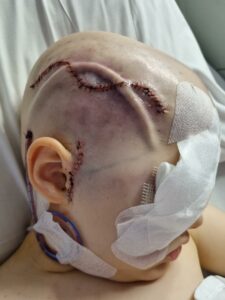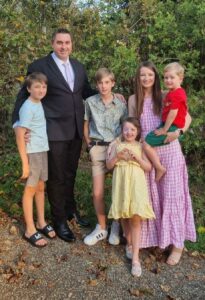In June 2021, Alice Morley was just 3 years when she was diagnosed with ‘Orbital Rhabdomyosarcoma’, a soft tissue cancer that affected her eye socket and optical nerve.
Although Alice was born with ‘ptosis’ – drooping eyelid – her parents noticed it was worsening. Doctors in Gladstone didn’t pick anything up during testing, so the family travelled to Brisbane to see her specialist, who immediately sent Alice to the hospital. She was then diagnosed with cancer. Five days later, Alice started her first round of chemotherapy.

6 months of chemotherapy and 28 rounds of radiation later, Alice went into remission in December 2021, only for her to relapse five months later. This time, the cancer threatened Alice’s life, and so the decision was taken to remove Alice’s eye and eye socket followed by another year of chemotherapy.
“She’d only spent five months in remission. It wasn’t worth risking another relapse. We tried our best to prepare her for the surgery, but it was really hard to know what it was going to look like. It wasn’t until after surgery that we understood what actually happened.” – Sian Morley, Alice’s mum

Now Alice is out of treatment, the family are trying to return to normal but it’s hard when you feel like the security blanket of treatment has been removed.
“We just have to have faith the cancer won’t come back now. That’s scary for a family like ours who have already had her relapse once. She’s made it longer than she did last time, but we know statistically it very well could and the likelihood is high. We just try to make the most out of every day.”
When it comes to research and information about childhood cancer, Sian says, “childhood cancer doesn’t get a lot of funding. The statistics show childhood cancer isn’t as rare as people think. As soon as you say cancer, let alone childhood cancer, people seize up, they don’t want to talk about it. But people need to know the signs and that it’s not rare, our kids are not just numbers.”
When it comes to supporting families navigating childhood cancer, Alice’s family asks for people to donate blood, “That’s the easiest way to do something to help because our kids have to have multiple blood/plasma platelets transfusions throughout treatment.”
 For the Morley family, it’s now a waiting game. Or as their ophthalmologist put it at their first MRI – “the conveyor belt” – terminology Alice’s mum actually found helpful as it means there is light at the end of the tunnel.
For the Morley family, it’s now a waiting game. Or as their ophthalmologist put it at their first MRI – “the conveyor belt” – terminology Alice’s mum actually found helpful as it means there is light at the end of the tunnel.
Each year in Australia, 40 children under the age of 15 are diagnosed with a soft tissue sarcoma, with only two or three, on average, affecting the eye. The signs for different childhood cancers vary from child to child; it could be a subtle lump or swelling that doesn’t go away, or maybe persistent headaches or trouble urinating.
If you, or someone you know, has been impacted by cancer, Cancer Council Queensland offer practical and emotional support services such as transport, accommodation, counselling and wigs and turbans.
If you need help, please call our information and support line on 13 11 20, Monday to Friday between 9am and 5pm.

